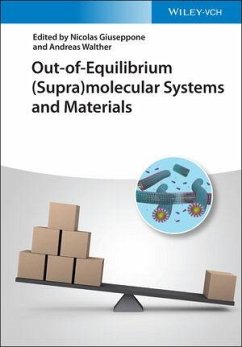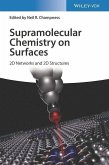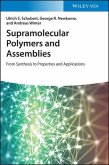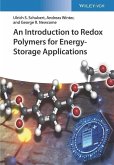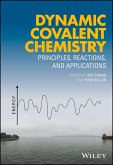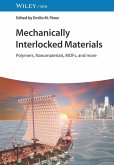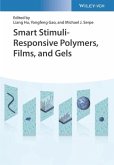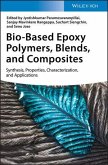Nicolas Giuseppone
Out-of-Equilibrium (Supra)molecular Systems and Materials
Herausgegeben:Giuseppone, Nicolas; Walther, Andreas
Nicolas Giuseppone
Out-of-Equilibrium (Supra)molecular Systems and Materials
Herausgegeben:Giuseppone, Nicolas; Walther, Andreas
- Gebundenes Buch
- Merkliste
- Auf die Merkliste
- Bewerten Bewerten
- Teilen
- Produkt teilen
- Produkterinnerung
- Produkterinnerung
This truly needed reference presents comprehensively every aspect about this emerging topic: Chapters about the design of dissipative self-assemblies, out-of-equilibrium chemical systems and oscillators and many more topics make this book an indispensable source.
Andere Kunden interessierten sich auch für
![Supramolecular Chemistry on Surfaces Supramolecular Chemistry on Surfaces]() Supramolecular Chemistry on Surfaces139,00 €
Supramolecular Chemistry on Surfaces139,00 €![Supramolecular Polymers and Assemblies Supramolecular Polymers and Assemblies]() Ulrich S. SchubertSupramolecular Polymers and Assemblies155,00 €
Ulrich S. SchubertSupramolecular Polymers and Assemblies155,00 €![An Introduction to Redox Polymers for Energy-Storage Applications An Introduction to Redox Polymers for Energy-Storage Applications]() Ulrich S. SchubertAn Introduction to Redox Polymers for Energy-Storage Applications129,00 €
Ulrich S. SchubertAn Introduction to Redox Polymers for Energy-Storage Applications129,00 €![Dynamic Covalent Chemistry Dynamic Covalent Chemistry]() Dynamic Covalent Chemistry200,99 €
Dynamic Covalent Chemistry200,99 €![Mechanically Interlocked Materials Mechanically Interlocked Materials]() Mechanically Interlocked Materials102,99 €
Mechanically Interlocked Materials102,99 €![Smart Stimuli-Responsive Polymers, Films, and Gels Smart Stimuli-Responsive Polymers, Films, and Gels]() Smart Stimuli-Responsive Polymers, Films, and Gels159,00 €
Smart Stimuli-Responsive Polymers, Films, and Gels159,00 €![Bio-Based Epoxy Polymers, Blends and Composites Bio-Based Epoxy Polymers, Blends and Composites]() Bio-Based Epoxy Polymers, Blends and Composites112,99 €
Bio-Based Epoxy Polymers, Blends and Composites112,99 €-
-
-
This truly needed reference presents comprehensively every aspect about this emerging topic: Chapters about the design of dissipative self-assemblies, out-of-equilibrium chemical systems and oscillators and many more topics make this book an indispensable source.
Produktdetails
- Produktdetails
- Verlag: Wiley-VCH
- Artikelnr. des Verlages: 1134615 000
- 1. Auflage
- Seitenzahl: 450
- Erscheinungstermin: 19. April 2021
- Englisch
- Abmessung: 250mm x 175mm x 29mm
- Gewicht: 1008g
- ISBN-13: 9783527346158
- ISBN-10: 3527346155
- Artikelnr.: 60093462
- Verlag: Wiley-VCH
- Artikelnr. des Verlages: 1134615 000
- 1. Auflage
- Seitenzahl: 450
- Erscheinungstermin: 19. April 2021
- Englisch
- Abmessung: 250mm x 175mm x 29mm
- Gewicht: 1008g
- ISBN-13: 9783527346158
- ISBN-10: 3527346155
- Artikelnr.: 60093462
Nicolas Giuseppone is Distinguished Professor of Chemistry (Classe Exceptionelle) at the University of Strasbourg since 2016. He received his PhD in asymmetric catalysis (laboratory of Prof. H.B. Kagan, University of Orsay, France), performed a post-doctoral research in total synthesis (laboratory of Prof. K.C. Nicolaou, The Scripps Research Institute, La Jolla CA, USA), and entered the field of supramolecular chemistry as a CNRS researcher (laboratory of Prof. J.-M. Lehn, University of Strasbourg, France). He started his own research group in 2008, and was nominated as a member of the Institut Universitaire de France (IUF) in 2013. His research interests are focused on supramolecular chemistry, molecular machines, and functional materials. Andreas Walther is a Professor at the Department of Chemistry at the University of Mainz (Germany). His research interests concentrate on developing and understanding hierarchical self-assembly concepts inside and outside equilibrium, and on using them to create active, adaptive and autonomous bioinspired material systems. He graduated from Bayreuth University in Germany in 2008 with a PhD focusing on the self- assembly behavior and applications of Janus particles and other soft, complex colloids. After a post-doctoral stay with a focus on biomimetic hybrid materials at Aalto University (Helsinki, Finland), he held positions at the Leibniz Institute for Interactive Materials in Aachen and the University of Freiburg, where he reoriented his research towards life-inspired materials systems. In 2020 he has been appointed to the present position supported by the Gutenberg Research College.
Out-of-equilibrium (supra)molecular systems and materials: An introduction
Learning from embryo development to engineer self-organizing materials
From clocks to synchrony: the design of bioinspired self-regulation in chemical systems
De novo design of chemical reaction networks and oscillators and their relation to emergent properties
Kinetically controlled supramolecular polymerization
Chemically fueled, transient supramolecular polymers
Design of chemical fuel driven self-assembly processes
Dynamic combinatorial chemistry out-of-equilibrium
Controlling self-assembly of nanoparticles using light
Photoswitchable components to drive molecular systems away from global thermodynamic minimum by light.
Out-of-equilibrium threaded and interlocked molecular structures
Light-driven rotary molecular motors for out-of-equilibrium systems
Design of active nanosystems incorporating biomolecular motors
Index
Learning from embryo development to engineer self-organizing materials
From clocks to synchrony: the design of bioinspired self-regulation in chemical systems
De novo design of chemical reaction networks and oscillators and their relation to emergent properties
Kinetically controlled supramolecular polymerization
Chemically fueled, transient supramolecular polymers
Design of chemical fuel driven self-assembly processes
Dynamic combinatorial chemistry out-of-equilibrium
Controlling self-assembly of nanoparticles using light
Photoswitchable components to drive molecular systems away from global thermodynamic minimum by light.
Out-of-equilibrium threaded and interlocked molecular structures
Light-driven rotary molecular motors for out-of-equilibrium systems
Design of active nanosystems incorporating biomolecular motors
Index
Out-of-equilibrium (supra)molecular systems and materials: An introduction
Learning from embryo development to engineer self-organizing materials
From clocks to synchrony: the design of bioinspired self-regulation in chemical systems
De novo design of chemical reaction networks and oscillators and their relation to emergent properties
Kinetically controlled supramolecular polymerization
Chemically fueled, transient supramolecular polymers
Design of chemical fuel driven self-assembly processes
Dynamic combinatorial chemistry out-of-equilibrium
Controlling self-assembly of nanoparticles using light
Photoswitchable components to drive molecular systems away from global thermodynamic minimum by light.
Out-of-equilibrium threaded and interlocked molecular structures
Light-driven rotary molecular motors for out-of-equilibrium systems
Design of active nanosystems incorporating biomolecular motors
Index
Learning from embryo development to engineer self-organizing materials
From clocks to synchrony: the design of bioinspired self-regulation in chemical systems
De novo design of chemical reaction networks and oscillators and their relation to emergent properties
Kinetically controlled supramolecular polymerization
Chemically fueled, transient supramolecular polymers
Design of chemical fuel driven self-assembly processes
Dynamic combinatorial chemistry out-of-equilibrium
Controlling self-assembly of nanoparticles using light
Photoswitchable components to drive molecular systems away from global thermodynamic minimum by light.
Out-of-equilibrium threaded and interlocked molecular structures
Light-driven rotary molecular motors for out-of-equilibrium systems
Design of active nanosystems incorporating biomolecular motors
Index

